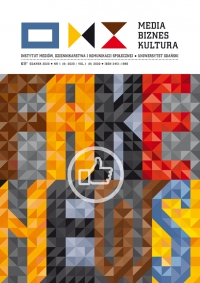Commodifying the Oriental Other. Liberal American media and reproduction of racism
Keywords:
media, orientalism, commodification, women, racismAbstract
The purpose of this article is the critical analysis of particular elements of the plot of The Good Wife, a legal and political CBS drama, conducted to present the way American media act as the orientalists and create the Orient when constructing the characters in popular TV series. The deconstruction of the threads related to one of supporting characters – Kalinda Sharma – allows to expose ethnic and gender stereotypes of the image of Oriental women, within the trend of postcolonial criticism and Edward Said’s theory. Interestingly, the series was signed by the liberal CBS station which has been trying to sustain the image of racism – free network since 2010 when they were criticized for underrepresentation of ethnic minorities, and promised to correct their policy. Instead, the network’s flagship series seems to have constructed the Oriental Other to fulfil the expectations and needs of the dominant, i.e. white culture.
Downloads
References
Flint J., The Good Wife’ will have multiple partners in syndication, https://www.latimes.com/entertainment/envelope/la-xpm-2013-mar-13-la-et-ct-good-wife-20130313-story.html (access: 9.10.2019).
Gilbert M., Why the ‚Good Wife’ is network TV’s last great drama, https://www.bostonglobe. com/arts/television/2016/05/04/alicia-trials-end-left-with-void/8htg2Ify1RTF6niNKj9aSP/story.html (access: 22.10.2019).
Gramsci A., Selections from the prison notebooks, trans. Quintin Hoare and Geoffrey Nowell Smith, International Publishers, New York 1971.
Hall S., Encoding and decoding the message [in:] The discourse studies reader: Main currents in theory and analysis, eds. R. Angelmuller, D. Maingueneau, R. Wodak, John Benjamins Publishing Company, Amsterdam/Philadelphia 2014.
Hall S., Representation: Cultural representations and signifying practices, Sage, Thousand Oaks, CA 1997.
hooks b., Eating the other: Desire and resistance [in:] Black looks: Race and representation, South End Press, Boston 1992.
Johnson K., Lennon S.L., Rudd N., Dress, body and self: research in the social psychology of dress [in:] Fashion & Textiles, https://link.springer.com/article/10.1186/s40691-014-0020-7 (access: 21.09.2019).
Kabbani R., Imperial fictions: Europe’s myths of orient, Saqi Books, London 1994.
Kenneth A., The meaning of culture. Moving postmodern critique forward, Preager, London 1998.
Macfie A.L., Orientalism, Longman, London 2002.
Media Scope 1998, “Diversity in Film and Television”, http://www.diversity-film-television/2007/media-scope (access: 21.09.2019).
Molan B., How The Good Wife transformed TV, https://www.theguardian.com/tv-and-radio/2016/may/05/the-good-wife-final-season-julianna-margulies-cbs (access: 29.12.2019).
Rosenberg A., In praise of ‘The Good Wife’s’ Kalinda Sharma, https://www.washingtonpost.com/news/act-four/wp/2014/10/17/in-praise-of-the-good-wifes-kalinda-sharma/ (access: 23.12.2019).
Said E., Orientalism, Pantheon Books, New York 1978.
Sardar Z,. Orientalism, Open University Press, Philadelphia, PA 1999.
The Good Wife, prod. R. King, M. King, cast J. Margulies, M. Czuchry, A. Panjabi, A. Cumming, J. Charles, C. Baranski, S01-s01, 2009–2016.

 Academic Scientific Journals
Academic Scientific Journals




